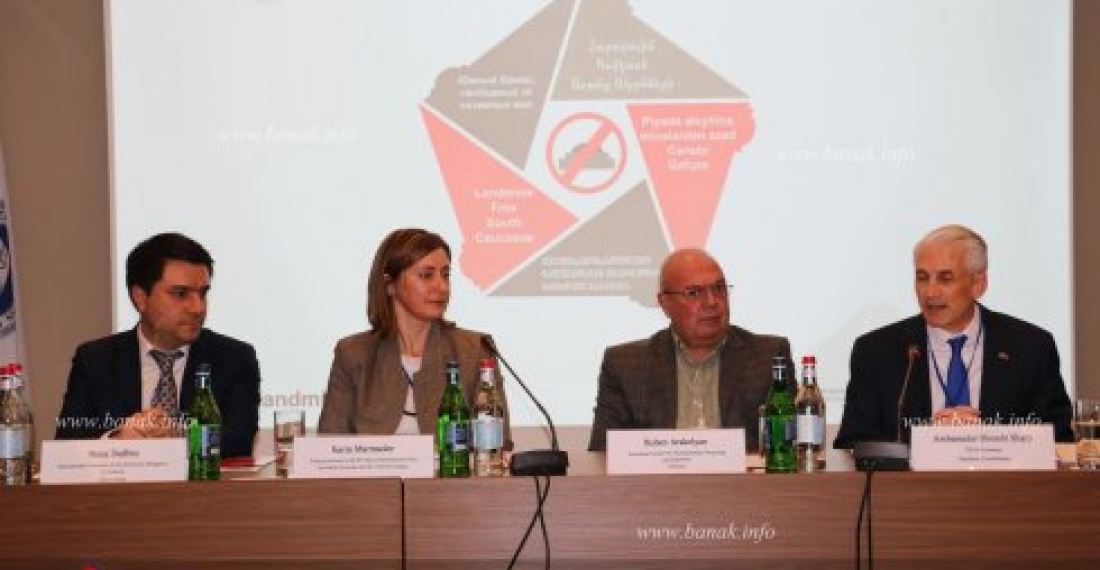As part of the activities marking Mine Awareness day, and in the framework of the regional awareness raising campaign LANDMINE FREE SOUTH CAUCASUS, a round table meeting was held in the Armenian capital Yerevan on Thursday, 4 April, with the participation of officials, diplomats and civil society organisations. The meeting was organised by the Armenian Centre for Humanitarian Demining and Expertise and LINKS (Dialogue, Analysis and Research).
At the start of the meeting, a message of greetings from Ana Hakobian, wife of Armenian prime minister Nikol Pashinyan, was read to participants. In her message Ana Hakobian said that Armenia was unfortunately one of the countries that faces the danger of landmines, resulting in human losses and negative socio-economic consequences. Over 35.000 people live under daily risk in mine contaminated areas in Armenia. "It is our duty to guarantee their right for safe and secure life", Ana Hakobian said in her message. She hailed the establshment of the Centre for Humanitarian Demining and Expertise, and thanked its staff for their work. In conclusion Ana Hakbobian said human safety should be at the centre of demining action and the right to human life was a supreme value which should not be sacrificed for political calculations.
The meeting was addressed by Karin Marmsoler, Political Advisor to the EU Special Representative for the South Caucasus, who said that the EU was pleased to support this event and the campaign LANDMINE FREE SOUTH CAUCASUS. She said the EU was supporting mine-clearance in 26 countries throughout the world. Mamsoler said she hoped that mine clearance action can be turned into a confidence building measure that would also help towards the settlement of the Karabakh conflict.
On his part, Ambassador Sombi Sharp, UN Resident Co-ordinator in Armenia spoke about the negative impact of landmines on both the environment and sustainable development. The UN was activie in many countries in the process of demining, and was also ready to support Armenia in this sector, he added.
The Deputy Head of Delegation of the International Committee of the Red Cross, Nima Dadbin, referred to the Ottawa Convention on Demining and said that this was the first international treaty that not only banned a particular weapon, but also asked that governments assist survivors of mine accidents. The ICRC advocated strong victim's assistance, and also saw a direct link between this and the Convention on the rights of the disabled.
Hunan Hunanyan, Chairman of the Satar Non Governmental Organisation for the diabled also addressed the meeting.
Speaking at the conclusion of the event LINKS (DAR) Director, Dennis Sammut said that demining was a humanitarian activity and needs to be seperated from broader political issues. On the other hand in the South Caucasus the regional context was very complicated and had to be factored in when considering this issue. LINKS understands that demining had in the past been a controversial and contentious issue. But that does not mean that in the future it could not also be a confidence-building measure, and LINKS was working towards this objective. He said that none of the three South Caucasus countries had signed and ratified the Ottawa convention on demining, despite the fact that the vast majority of countries in the world had. He said the matter needs to be approached with a regional dimension, and he hoped that a time will come when all three countries can do so simultaneously.
After the end of the Round table Meeting participants joined a street action on Yerevan's Northern Avenue where children expressed their feelings on International Mine Awareness day through positive messages painted on the ground, whilst demining experts explained the process of demining to visitors to a special set up stand. Those present at the end held up placards with the slogan LANDMINE FREE SOUTH CAUCASUS
.
source: commonspace.eu
photo 1: The Director of the centre for Humanitarian demining and Expertise, mr Reuben Arakelian, flanked by representatives of the EU, the UN and the ICRC at an event in Yerevan on Thursday 4 April 2019 to mark International Mine Awareness Day. the activity was held in the framework of the campaign LANDMINE FREE SOUTH CAUCASUS. (picture courtesy of banak.info)
photo 2: Street action on Yerevan's Northern Avenue as part of the campaign LANDMINE FREE SOUTH CAUCASUS (picture courtesy of banak.info)
#landminefreeSC







